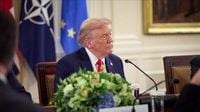On the eve of Labor Day weekend 2025, the debate over tariffs and American trade policy erupted into the national spotlight once again, propelled by a fiery statement from US President Donald Trump. Taking to his Truth Social platform on August 30, Trump declared, "ALL TARIFFS ARE STILL IN EFFECT!"—a message that came in direct response to a recent ruling by the Court of Appeals for the Federal Circuit. The court had affirmed a lower court’s finding that several of Trump’s executive orders establishing sweeping tariffs exceeded his presidential authority, a move that has sparked intense reactions across the political spectrum and among American businesses.
According to Anadolu Agency, the Court of Appeals for the Federal Circuit upheld a previous decision by the Court of International Trade, which had invalidated five executive orders enacting indefinite tariffs on virtually all imports from nearly every nation. This legal challenge was not just a matter for the courts; it was brought forth by a coalition that included the states of Oregon, Arizona, Colorado, and New York, as well as a host of impacted companies. For these states and businesses, the tariffs represented a costly disruption to supply chains and international commerce, prompting them to seek legal redress against what they considered an overreach of executive power.
But President Trump was not about to let the decision go unchallenged. In his Truth Social post, he described the appeals court as "highly partisan" and insisted that the United States would ultimately prevail. "If these Tariffs ever went away, it would be a total disaster for the Country. It would make us financially weak, and we have to be strong," Trump wrote, according to APA. He went on to argue that the United States could no longer afford to tolerate "enormous Trade Deficits and unfair Tariffs and Non Tariff Trade Barriers imposed by other Countries, friend or foe, that undermine our Manufacturers, Farmers, and everyone else."
Trump’s rhetoric was unmistakably urgent. He warned that if the court’s decision to remove the tariffs were allowed to stand, "this Decision would literally destroy the United States of America." For Trump and his supporters, tariffs are not just a matter of economic policy but are deeply entwined with national strength and sovereignty. He asserted, "TARIFFS are the best tool to help our Workers, and support Companies that produce great MADE IN AMERICA products."
In a nod to the significance of the Labor Day weekend—a time traditionally dedicated to celebrating American workers—Trump framed his argument as a defense of those very workers. "For many years, Tariffs were allowed to be used against us by our uncaring and unwise Politicians. Now, with the help of the United States Supreme Court, we will use them to the benefit of our Nation, and Make America Rich, Strong, and Powerful Again!" he proclaimed in his post, rallying his base with echoes of his longstanding campaign slogans.
The legal battle that led to this public outcry has been brewing for months. The Court of International Trade originally found that Trump’s executive orders—issued during his previous term—overstepped the boundaries of presidential authority by imposing tariffs indefinitely and on such a broad range of imports. The appeals court’s decision to uphold this ruling signaled a significant check on executive power in the realm of trade policy, underscoring the judiciary’s role as a counterbalance in the American system of government.
For the states and companies challenging the tariffs, the issue was as much about the rule of law as it was about economic impact. They argued that the indefinite nature of the tariffs created instability, raised costs for American businesses, and risked retaliation from trading partners. These concerns were especially acute for import-heavy sectors such as manufacturing, agriculture, and retail, where global supply chains are the norm and sudden changes in tariff policy can have far-reaching consequences.
Yet, Trump’s pointed response suggests the issue is far from settled. He has repeatedly characterized the court’s actions as partisan and out of step with the needs of the nation. According to Anadolu Agency, Trump insisted in his Truth Social post, "ALL TARIFFS ARE STILL IN EFFECT," seeking to reassure his supporters and perhaps to signal to the markets that the legal wrangling has not yet led to a change in policy. He doubled down on his position, warning that removing the tariffs would be "a total disaster for the Country" and would render America "financially weak."
Trump’s warnings about trade deficits and unfair foreign trade practices tap into longstanding anxieties about America’s place in the global economy. For decades, both major political parties have wrestled with how to address the nation’s trade imbalances and the perceived erosion of its manufacturing base. Trump’s approach—emphasizing tariffs as a tool for economic protectionism—has been both lauded and criticized. Supporters argue that tariffs level the playing field for American workers and industries, while critics contend that they raise prices for consumers and provoke retaliatory measures from other countries.
Notably, Trump credited the United States Supreme Court for its role in supporting the use of tariffs to "benefit our Nation," though the current legal battle is still making its way through the appeals process. His confidence in the Supreme Court’s eventual backing underscores the high stakes of the ongoing judicial review, as well as the profound influence the Court holds over the direction of US trade policy.
As the legal process continues, the fate of the tariffs—and the broader question of presidential authority in trade matters—remains uncertain. For now, Trump’s declaration that "ALL TARIFFS ARE STILL IN EFFECT" stands as both a statement of current policy and a rallying cry for those who see tariffs as essential to American strength. Meanwhile, the voices of states, businesses, and consumers affected by the tariffs continue to press their case in the courts and in the public arena.
With Labor Day marking a time of reflection on the contributions of American workers, the debate over tariffs and trade policy has once again taken center stage. The outcome of this legal and political struggle will shape not only the future of US trade but also the broader question of how America defines its economic interests in a rapidly changing world.
As both sides brace for the next chapter in the courts, one thing is clear: the conversation about tariffs, trade, and America’s place in the global economy is far from over.




